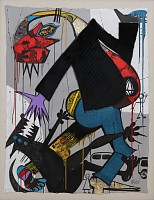BIOGRAPHY

(b.1985 Tzaneen, South Africa)
“I’m working to find the inner part of the human being. So I am stripping that person out...taking the clothes, the skin, the bones. I’m trying to see what can come out of this person. Then I rebuild. I call it the lust of the heart. It is never satisfied.”
– Blessing Ngobeni, 2019
Blessing Ngobeni was born in the small town of Tzaneen, located in the largely rural Limpopo province of South Africa. He moved to the Johannesburg metropolis at a very young age, where he experienced many hardships, from living on the streets, to serving time in prison – what he describes as “the usual South African story“. He has since then built an exceptional and unique career in the South African art industry. Bringing with him a unique style and a critique of political regimes, Ngobeni made the corruption, incompetence and duplicity of current South African ruling elite the subjects of his art. He tackles the disconcerting consequences of betraying democratic ideals, the failure to learn from historical tragedies and the expanding gap between the rich and poor. This critique is informed by Ngobeni’s own experience, the hardships and challenges he had to confront as a child and adolescent. As a result of his exceptional work and dedication to his practice, Ngobeni received the highly-prestigious Standard Bank Young Artist Award for the Visual Arts in 2020.
Ngobeni is known for his distinctive style, created with layers of acrylic washes, exaggerated figures and collage, accompanied by unapologetic titles such as ‘Democracy is a Dust Bin’, or ‘A Study of Corruption’. He uses his expressionist paintings not only to overtly critique the current status quo, but to ask uncomfortable questions about the African’s experience of the world. His languages also draw inspiration from various movements, including Surrealism and Neo-Expressionism. He re-examines and re-imagines working ideas by artists including Jean-Michel Basquiat, David Koloane and Pablo Picasso.
Ngobeni confronts his own experiences, and challenges them in the often nightmarishly absurd and violent scenes of his paintings. These scenes, though brutal and honest, are also a display of the artist’s visual sensitivities to line, image and the power of colour.
In his recent bodies of work, Ngobeni engages with the idea of a haunting past – specifically with regards to African history, in a scathing condemnation of the continent’s current political and socio-economic status as a result of our colonial past. This engagement does not lie only in his conceptual foundations, but in his process of making, of carefully and laboriously constructing artworks from extant imagery as well as his own imagination. His distorted figures are often pregnant, their bulging bellies heavy with collected collage pieces which are sourced from local and international press, newspaper clippings, glossy magazines and social media. For Ngobeni the past, or history, never left us; it defines our everyday lives.
In addition to the Standard Bank Young Artist Award, Ngobeni is the recipient of a number of awards, including the Reinhold Cassirer Art Award by Nadine Gordimer (2012), the Mail and Guardian ‘200 Young South Africans’ and the Arts & Culture Trust Young Professional ImpACT award (2013). His work has been included in the most recent Phaidon publication in the P series, 'Vitamin P3: New Perspectives in Painting' (2016).
It is of importance to note that Ngobeni is an artist focusing on more than his own evolving career. His efforts in mentoring young artists have lead him to form two projects which support young artists who are transitioning from their training to their careers as full-time practitioners. The first, in collaboration with the Bag Factory, is the ‘Blessing Ngobeni Studio Art Award’ established in 2017. The second is called ‘Initiative’ and introduces young artists to the art industry through a series of workshops, culminating in an opportunity for them to participate in a group show. This empowering work attests to Ngobeni’s personal and professional contribution to the art world and society at large.
